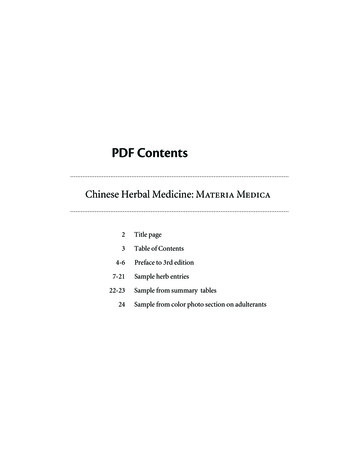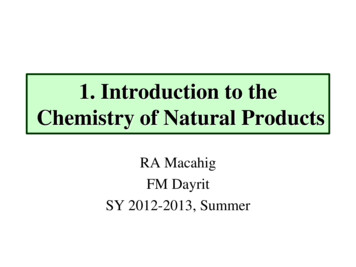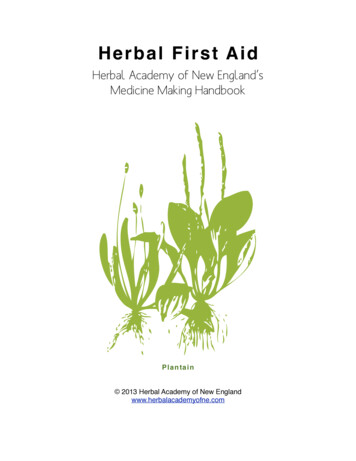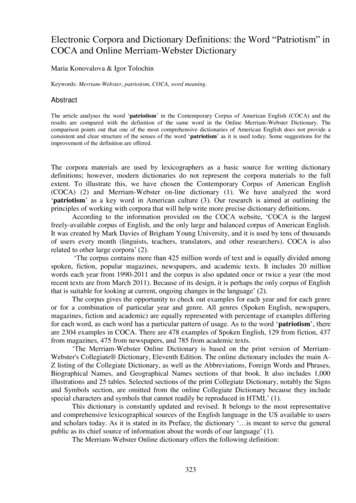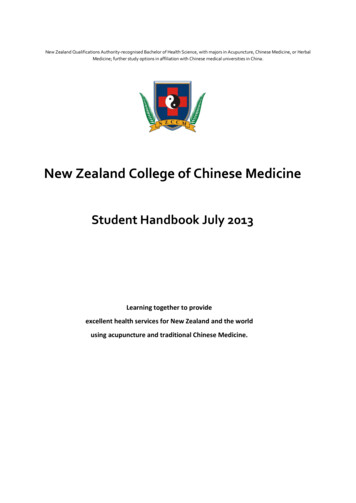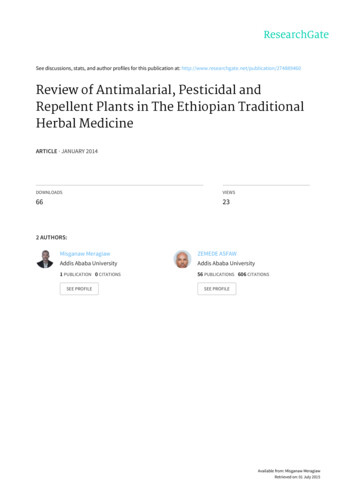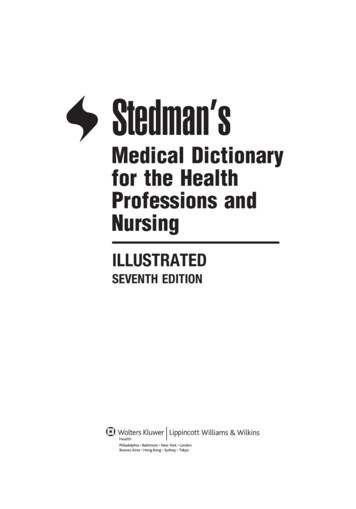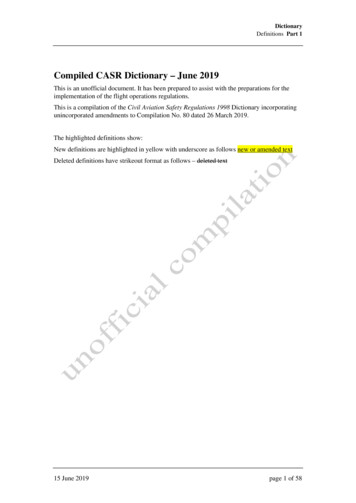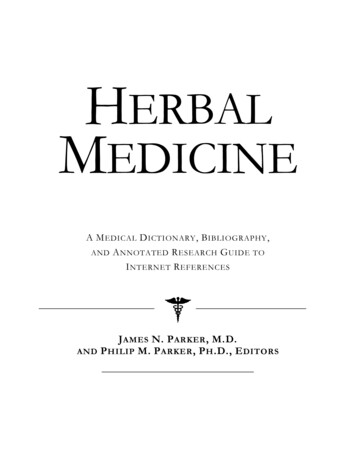
Transcription
HERBALMEDICINEA M EDICAL D ICTIONARY , B IBLIOGRAPHY ,AND A NNOTATED R ESEARCH G UIDE TOI NTERNET R EFERENCESJ AMES N. P ARKER , M.D.AND P HILIP M. P ARKER , P H .D., E DITORS
iiICON Health PublicationsICON Group International, Inc.4370 La Jolla Village Drive, 4th FloorSan Diego, CA 92122 USACopyright 2004 by ICON Group International, Inc.Copyright 2004 by ICON Group International, Inc. All rights reserved. This book is protected by copyright. No part of itmay be reproduced, stored in a retrieval system, or transmitted in any form or by any means, electronic, mechanical,photocopying, recording, or otherwise, without written permission from the publisher.Printed in the United States of America.Last digit indicates print number: 10 9 8 7 6 4 5 3 2 1Publisher, Health Care: Philip Parker, Ph.D.Editor(s): James Parker, M.D., Philip Parker, Ph.D.Publisher's note: The ideas, procedures, and suggestions contained in this book are not intended for the diagnosis ortreatment of a health problem. As new medical or scientific information becomes available from academic and clinicalresearch, recommended treatments and drug therapies may undergo changes. The authors, editors, and publisher haveattempted to make the information in this book up to date and accurate in accord with accepted standards at the time ofpublication. The authors, editors, and publisher are not responsible for errors or omissions or for consequences fromapplication of the book, and make no warranty, expressed or implied, in regard to the contents of this book. Any practicedescribed in this book should be applied by the reader in accordance with professional standards of care used in regard tothe unique circumstances that may apply in each situation. The reader is advised to always check product information(package inserts) for changes and new information regarding dosage and contraindications before prescribing any drug orpharmacological product. Caution is especially urged when using new or infrequently ordered drugs, herbal remedies,vitamins and supplements, alternative therapies, complementary therapies and medicines, and integrative medicaltreatments.Cataloging-in-Publication DataParker, James N., 1961Parker, Philip M., 1960Herbal Medicine: A Medical Dictionary, Bibliography, and Annotated Research Guide to Internet References /James N. Parker and Philip M. Parker, editorsp.cm.Includes bibliographical references, glossary, and index.ISBN: 0-597-83980-81. Herbal Medicine-Popular works. I. Title.
iiiDisclaimerThis publication is not intended to be used for the diagnosis or treatment of a healthproblem. It is sold with the understanding that the publisher, editors, and authors are notengaging in the rendering of medical, psychological, financial, legal, or other professionalservices.References to any entity, product, service, or source of information that may be contained inthis publication should not be considered an endorsement, either direct or implied, by thepublisher, editors, or authors. ICON Group International, Inc., the editors, and the authorsare not responsible for the content of any Web pages or publications referenced in thispublication.Copyright NoticeIf a physician wishes to copy limited passages from this book for patient use, this right isautomatically granted without written permission from ICON Group International, Inc.(ICON Group). However, all of ICON Group publications have copyrights. With exceptionto the above, copying our publications in whole or in part, for whatever reason, is a violationof copyright laws and can lead to penalties and fines. Should you want to copy tables,graphs, or other materials, please contact us to request permission (E-mail:iconedit@san.rr.com). ICON Group often grants permission for very limited reproduction ofour publications for internal use, press releases, and academic research. Such reproductionrequires confirmed permission from ICON Group International Inc. The disclaimer abovemust accompany all reproductions, in whole or in part, of this book.
ivAcknowledgementsThe collective knowledge generated from academic and applied research summarized invarious references has been critical in the creation of this book which is best viewed as acomprehensive compilation and collection of information prepared by various officialagencies which produce publications on herbal medicine. Books in this series draw fromvarious agencies and institutions associated with the United States Department of Healthand Human Services, and in particular, the Office of the Secretary of Health and HumanServices (OS), the Administration for Children and Families (ACF), the Administration onAging (AOA), the Agency for Healthcare Research and Quality (AHRQ), the Agency forToxic Substances and Disease Registry (ATSDR), the Centers for Disease Control andPrevention (CDC), the Food and Drug Administration (FDA), the Healthcare FinancingAdministration (HCFA), the Health Resources and Services Administration (HRSA), theIndian Health Service (IHS), the institutions of the National Institutes of Health (NIH), theProgram Support Center (PSC), and the Substance Abuse and Mental Health ServicesAdministration (SAMHSA). In addition to these sources, information gathered from theNational Library of Medicine, the United States Patent Office, the European Union, and theirrelated organizations has been invaluable in the creation of this book. Some of the workrepresented was financially supported by the Research and Development Committee atINSEAD. This support is gratefully acknowledged. Finally, special thanks are owed toTiffany Freeman for her excellent editorial support.
vAbout the EditorsJames N. Parker, M.D.Dr. James N. Parker received his Bachelor of Science degree in Psychobiology from theUniversity of California, Riverside and his M.D. from the University of California, SanDiego. In addition to authoring numerous research publications, he has lectured at variousacademic institutions. Dr. Parker is the medical editor for health books by ICON HealthPublications.Philip M. Parker, Ph.D.Philip M. Parker is the Eli Lilly Chair Professor of Innovation, Business and Society atINSEAD (Fontainebleau, France and Singapore). Dr. Parker has also been Professor at theUniversity of California, San Diego and has taught courses at Harvard University, the HongKong University of Science and Technology, the Massachusetts Institute of Technology,Stanford University, and UCLA. Dr. Parker is the associate editor for ICON HealthPublications.
viAbout ICON Health PublicationsTo discover more about ICON Health Publications, simply check with your preferred onlinebooksellers, including Barnes&Noble.com and Amazon.com which currently carry all of ourtitles. Or, feel free to contact us directly for bulk purchases or institutional discounts:ICON Group International, Inc.4370 La Jolla Village Drive, Fourth FloorSan Diego, CA 92122 USAFax: 858-546-4341Web site: www.icongrouponline.com/health
viiTable of ContentsFORWARD . 1CHAPTER 1. STUDIES ON HERBAL MEDICINE . 3Overview. 3The Combined Health Information Database. 3Federally Funded Research on Herbal Medicine. 5E-Journals: PubMed Central . 21The National Library of Medicine: PubMed . 21CHAPTER 2. NUTRITION AND HERBAL MEDICINE . 51Overview. 51Finding Nutrition Studies on Herbal Medicine. 51Federal Resources on Nutrition . 55Additional Web Resources . 55CHAPTER 3. ALTERNATIVE MEDICINE AND HERBAL MEDICINE . 59Overview. 59The Combined Health Information Database. 59National Center for Complementary and Alternative Medicine. 62Additional Web Resources . 81General References . 118CHAPTER 4. DISSERTATIONS ON HERBAL MEDICINE . 119Overview. 119Dissertations on Herbal Medicine . 119Keeping Current . 120CHAPTER 5. BOOKS ON HERBAL MEDICINE . 121Overview. 121Book Summaries: Federal Agencies. 121Book Summaries: Online Booksellers. 122Chapters on Herbal Medicine. 129Directories. 129CHAPTER 6. MULTIMEDIA ON HERBAL MEDICINE. 131Overview. 131Bibliography: Multimedia on Herbal Medicine . 131CHAPTER 7. PERIODICALS AND NEWS ON HERBAL MEDICINE. 133Overview. 133News Services and Press Releases. 133Newsletter Articles . 136Academic Periodicals covering Herbal Medicine . 137APPENDIX A. PHYSICIAN RESOURCES . 141Overview. 141NIH Guidelines. 141NIH Databases. 143Other Commercial Databases. 146APPENDIX B. PATIENT RESOURCES . 147Overview. 147Patient Guideline Sources. 147Finding Associations. 153APPENDIX C. FINDING MEDICAL LIBRARIES . 155Overview. 155Preparation. 155Finding a Local Medical Library. 155Medical Libraries in the U.S. and Canada . 155
viii ContentsONLINE GLOSSARIES. 161Online Dictionary Directories . 161HERBAL MEDICINE DICTIONARY . 163INDEX . 215
1FORWARDIn March 2001, the National Institutes of Health issued the following warning: "The numberof Web sites offering health-related resources grows every day. Many sites provide valuableinformation, while others may have information that is unreliable or misleading."1Furthermore, because of the rapid increase in Internet-based information, many hours canbe wasted searching, selecting, and printing. Since only the smallest fraction of informationdealing with herbal medicine is indexed in search engines, such as www.google.com orothers, a non-systematic approach to Internet research can be not only time consuming, butalso incomplete. This book was created for medical professionals, students, and members ofthe general public who want to know as much as possible about herbal medicine, using themost advanced research tools available and spending the least amount of time doing so.In addition to offering a structured and comprehensive bibliography, the pages that followwill tell you where and how to find reliable information covering virtually all topics relatedto herbal medicine, from the essentials to the most advanced areas of research. Public,academic, government, and peer-reviewed research studies are emphasized. Variousabstracts are reproduced to give you some of the latest official information available to dateon herbal medicine. Abundant guidance is given on how to obtain free-of-charge primaryresearch results via the Internet. While this book focuses on the field of medicine, whensome sources provide access to non-medical information relating to herbal medicine,these are noted in the text.E-book and electronic versions of this book are fully interactive with each of the Internetsites mentioned (clicking on a hyperlink automatically opens your browser to the siteindicated). If you are using the hard copy version of this book, you can access a cited Website by typing the provided Web address directly into your Internet browser. You may findit useful to refer to synonyms or related terms when accessing these Internet databases.NOTE: At the time of publication, the Web addresses were functional. However, some linksmay fail due to URL address changes, which is a common occurrence on the Internet.For readers unfamiliar with the Internet, detailed instructions are offered on how to accesselectronic resources. For readers unfamiliar with medical terminology, a comprehensiveglossary is provided. For readers without access to Internet resources, a directory of medicallibraries, that have or can locate references cited here, is given. We hope these resources willprove useful to the widest possible audience seeking information on herbal medicine.The Editors1From the NIH, National Cancer Institute (NCI): w.
3CHAPTER 1. STUDIES ON HERBAL MEDICINEOverviewIn this chapter, we will show you how to locate peer-reviewed references and studies onherbal medicine.The Combined Health Information DatabaseThe Combined Health Information Database summarizes studies across numerous federalagencies. To limit your investigation to research studies and herbal medicine, you will needto use the advanced search options. First, go to http://chid.nih.gov/index.html. From there,select the “Detailed Search” option (or go directly to that page with the following hyperlink:http://chid.nih.gov/detail/detail.html). The trick in extracting studies is found in the dropboxes at the bottom of the search page where “You may refine your search by.” Select thedates and language you prefer, and the format option “Journal Article.” At the top of thesearch form, select the number of records you would like to see (we recommend 100) andcheck the box to display “whole records.” We recommend that you type “herbal medicine”(or synonyms) into the “For these words:” box. Consider using the option “anywhere inrecord” to make your search as broad as possible. If you want to limit the search to only aparticular field, such as the title of the journal, then select this option in the “Search in thesefields” drop box. The following is what you can expect from this type of search: Treatment of Irritable Bowel Syndrome with Chinese Herbal Medicine: ARandomized Controlled TrialSource: JAMA. Journal of the American Medical Association. 280(18): 1585-1589.November 11, 1998.Summary: Irritable bowel syndrome (IBS) is a common functional bowel disorder forwhich there is no reliable medical treatment. This article reports on a study undertakento determine whether Chinese herbal medicine (CHM) is of any benefit in treating IBS.The 116 patients were recruited through 2 teaching hospitals and 5 private practices ofgastroenterologists and received CHM in 3 Chinese herbal clinics. Patients wererandomly allocated to 1 of 3 treatment groups: individualized Chinese herbalformulations (n 38), a standard Chinese herbal formulation (n 43), or placebo (n 35). Patients received 5 capsules 3 times a day for 16 weeks and were evaluated
4Herbal Medicineregularly by a traditional Chinese herbalist and a gastroenterologist. Patients,gastroenterologists, and herbalists were all blinded to treatment group. The outcomemeasures were change in total bowel symptom scale scores and global improvementassessed by patients and gastroenterologists and change in the degree of interferencewith life caused by IBS symptoms assessed by patients. Compared with patients in theplacebo group, patients in the active treatment groups had significant improvement inbowel symptom scores (as rated by patients and by gastroenterologists) and significantglobal improvement as rated by both patients and gastroenterologists. Patients reportedthat treatment significantly reduced the degree of interference with life caused by IBSsymptoms. Chinese herbal formulations individually tailored to the patient proved nomore effective than standard CHM treatment. On followup 14 weeks after completion oftreatment, only the individualized CHM treatment group maintained improvement. Theauthors conclude that Chinese herbal formulations appear to improve symptoms forsome patients with IBS. 4 tables. 22 references. (AA-M). A Look at Chinese Herbal Medicine From A Western PerspectiveSource: Searchlight; Spring 1994.Contact: AIDS Research Alliance, 621-A N San Vicente Blvd, West Hollywood, CA,90069, (310) 358-2423.Summary: This article examines the use of herbal medicine and its growing acceptanceas a method of health care in the United States. Herbal medicine continues to be anaccepted form of treatment in the Orient, and plant drugs based on traditional practicerepresent a huge portion of the pharmaceutical production in modern Germany. In theU.S., three forces have revived the interest in herbal medicine. First, concerns have beenraised that modern pharmaceutical practice too often involves costly drugs that produceunacceptable side effects; second, the experience in Europe shows that naturalsubstances can apparently address several modern health concerns with fewer sideeffects; and third, the experience in Japan and China shows that modern medicine andtraditional herbal medicine can be combined. The author reviews the characteristics ofherbal medicine, which actually refer to any natural material of plant, animal, or mineralorigin, or any traditional or modern preparation of the natural materials short ofpreparing an isolated chemical. The author describes the medical use of herbs and theiractive components. In combination with recent advances in preventive care andtreatment of opportunistic infections, herbal medications may prove to be useful tools inreducing symptoms and improving the quality of life for those with HIV-related illness. Herbal Medicine: Some Do's and Don't's for Dialysis PatientsSource: For Patients Only. 11(2): 22-23. March-April 1998.Contact: Available from For Patients Only. 18 East 41st Street, New York, NY 10017.(818) 704-5555. Fax (818) 704-6500.Summary: This article provides some general guidelines regarding herbal medicine.Designed for readers with kidney disease, the article encourages patients to educatethemselves adequately before trying any alternative or complementary medicine whilethey are on dialysis. The author emphasizes the importance of informing health careproviders of any supplements or products that one is using in an adjunctive fashionwhile on dialysis. The author lists a few herbal medicines that can cause a significantdecrease in potassium levels and pose a risk to dialysis patients: castor bean oil, aloeferox resin, cascara sagrada bark, senna leaves or pods, and licorice root. The articleincludes brief guidelines to follow to ensure the safe use of herbal supplements or other
Studies5over-the-counter products. The article concludes with information about the U.S.Government's Office of Alternative Medicine (OAM) and how to reach this office (800531-1794 or http://altmed.od.nih.gov). Herbal Medicine Boom: Understanding What Patients Are TakingSource: Cleveland Clinic Journal of Medicine. 65(3): 129-134. March 1998.Summary: This journal article is designed to help physicians guide their patients in theuse of herbal medicines. The first section outlines the reasons why people take herbalmedicines, including a fear or distrust of physicians, the belief that natural is better,disappointment with allopathic care, and cultural influences. The second section listssome of the most commonly used herbal medications, their reputed effects, and what isknown about possible side effects and drug interactions. The herbal medicines areginseng, garlic, ginkgo, echinacea, ma huang, saw palmetto, St. John's wort, valerian,and yohimbe. The final section explains why herbal medicine should be regulated; andproposes that manufacturers should be required to ensure the standardization, purity,and consistency of their products. The article includes a list of practical suggestions tooffer patients about the use of herbal medicines, and 30 references. Herbal Medicines: Poison or Potions?Source: Journal of Laboratory and Clinical Medicine. 139(6): 343-8. June 2002.Summary: This journal article provides a wide variety of information on herbalmedicines, including the reasons for their use, safety issues, beneficial effects, adverseeffects, and the role that physicians can play in helping patients make informedtreatment decisions. The article gives examples of adverse effects from specific herbs,including: Herbal Ecstasy and Parkinson's syndrome; Chinese medications withundeclared prescription drugs; Indian herbal medications with lead contamination;valerian withdrawal syndrome; adverse reactions of St. John's wort; mu tong andnephropathy; saw palmetto and liver disease; dong quai and hypertension; andkombucha mushroom and coagulation disorders. 1 table. 38 references. 6 pages. What You and Your Patients Should Know About Herbal MedicinesSource: JAAPA. 14(11): 27-34. November 2001.Summary: This journal article provides information about what patients should knowabout herbal medicines. It lists online and print resources where patients can get moreinformation on herbal medicines, dangerous herbs that should not be used, andcommon uses of popular botanical-based products. It also discusses that the Food andDrug Administration does not regulate herbal products and how the burden of ensuringsafe use falls on providers and patients. 2 tables. 3 figures. 24 references. 6 pages.Federally Funded Research on Herbal MedicineThe U.S. Government supports a variety of research studies relating to herbal medicine.These studies are tracked by the Office of Extramural Research at the National Institutes ofHealth.2 CRISP (Computerized Retrieval of Information on Scientific Projects) is a searchable2Healthcare projects are funded by the National Institutes of Health (NIH), Substance Abuse and Mental HealthServices (SAMHSA), Health Resources and Services Administration (HRSA), Food and Drug Administration
6Herbal Medicinedatabase of federally funded biomedical research projects conducted at universities,hospitals, and other institutions.Search the CRISP Web site at http://crisp.cit.nih.gov/crisp/crisp query.generate screen.You will have the option to perform targeted searches by various criteria, includinggeography, date, and topics related to herbal medicine.For most of the studies, the agencies reporting into CRISP provide summaries or abstracts.As opposed to clinical trial research using patients, many federally funded studies useanimals or simulated models to explore herbal medicine. The following is typical of the typeof information found when searching the CRISP database for herbal medicine: Project Title: ADVANCES IN ALLERGY, ASTHMA AND IMMUNOLOGYPrincipal Investigator & Institution: Bielory, Leonard; Medicine; Univ of Med/Dent NjNewark Newark, Nj 07103Timing: Fiscal Year 2002; Project Start 01-JUL-2002; Project End 30-JUN-2003Summary: (provided by applicant): Allergy is one of the most common reasons thatindividuals use alternative and complementary medicine (CAM). There is a plethora ofreports regarding CAM in the treatment of allergy, asthma and immunology, but thereis a dirth of scientific studies, plenary sessions, workshops presented in the nationallyrecognized forums. Objective: This application plans to explore "state of the art" CAMpractices and "integrate" them into the annual meetings of the 2 major Allergy andImmunology organizations (American College of Allergy, Asthma and Immunology(ACAAI) and the American Academy of Allergy, Asthma and immunology (AAAAI)by: 1) providing the initial infrastructure for the submission of rigorous originalscientific information related to allergic, asthmatic and immunologic disorders; 2)developing an ongoing scientific forum within the framework of the nationalorganizations; 3) generating new research ideas and facilitating collaboration; and 4)publishing the proceedings and providing an ongoing internet resource site related tothis application. This will be coordinated by the CAM Oversight Committee (CAMOC)consisting of respected allergy and immunology researchers in conjunction with theUMDNJ - Asthma & Allergy Research Center and the Center for the Study ofAlternative and Complementary Medicine. The CAM Advisory Board (CAMAB) will beconstituted with leaders from professional national organizations to providemultidisciplinary panel discussions and to generate CAM research priorities for thesedisciplines as they relate to allergy, asthma and immunology. Preliminary Work: Singleworkshops have been instituted at each of the upcoming annual meetings (ACAAI11/01 and AAAAI 03/02). Commitments for a whole day CAM symposium at theACAAI (11/14/02) and the publication of the proceedings have been obtained. Thetentative schedule provides for the Overview of CAM; Overview of Herbal Medicine inAsthma; Overview of Homeopathy in Allergies; Overview of Probiotics in AtopicDermatitis; Medico-Legal Aspects and Adverse Reactions. Summary: This applicationwill provide the catalyst for establishing an ongoing forum for the review andpromotion of scientifically based research assessing the impact of CAM in allergy,asthma and immunology.Website: http://crisp.cit.nih.gov/crisp/Crisp Query.Generate Screen(FDA), Centers for Disease Control and Prevention (CDCP), Agency for Healthcare Research and Quality (AHRQ),and Office of Assistant Secretary of Health (OASH).
Studies Project Title: Principal Investigator & Institution: Cheung, Nai-Kong V.; Sloan-Kettering Institute forCancer Res New York, Ny 10021Timing: Fiscal Year 2002; Project Start 01-MAR-2002; Project End 29-FEB-2004Summary: This proposal is a phase I trial of orally administered beta-glucan that canenhance the anti-tumor effects of anti-GD2 monoclonal antibody. (MoAb) in
on herbal medicine. Abundant guidance is given on how to obtain free-of-charge primary research results via the Internet. While this book focuses on the field of medicine, when some source

